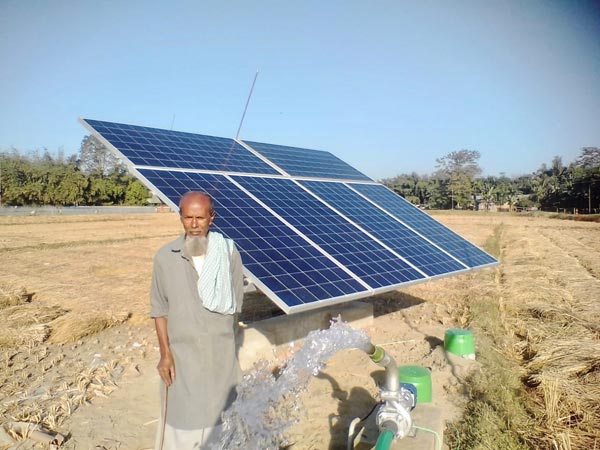From pv magazine India
India has the world’s most arable land, and farmers currently irrigate their fields with more than 30 million agro pump-sets. Out of these, 22 million pump-sets are connected to the grid, around 10 million pumps are diesel pumps, while 3,50,000 pumps are solar pumps, mostly deployed in the last five years.
Grid-powered pump-sets consume more than 18% of the total annual electricity consumption of India and diesel pump sets consume over 5.5% of the overall diesel import bill. In the 2017-18 period, the annual electricity subsidy for agriculture alone amounted to over INR 1.1 trillion ($14.7 billion) and the annual diesel import bill towards agro-pump sets was estimated at around INR 0.4 trillion.
As a country, India is one of the biggest agriculture-driven economies, making our farmers front-runners in the race. The agriculture sector alone accounts for nearly 18.33% of India’s electricity consumption. The deployment of solar-powered pumps helps in reducing electricity consumption and shifting that load to green energy.
With more than 75% of the population directly engaged with agriculture, it is safe to say that India is primarily an agrarian society. The government is taking all possible steps to support Anna Daata (farmers) of our country. The Ministry of New and Renewable Energy (MNRE) unveiled the PM-KUSUM (Pradhan Mantri Kisan Urja Suraksha Evam Utthan Mahaabhiyan) Scheme, which aimed to add solar and other renewable capacities of 25,750 MW.
In most cases, the grid electricity supply is erratic during the night. Battery-coupled solar-powered water pumps running on a renewable source of energy ensure water supply anytime water is required. Also, farmers need not visit the farm at midnight to switch on diesel power to the pump in case of a grid outage. Additionally, solar power creates employment opportunities, particularly in rural areas, and improves the standard of living of the farmers.
At COP26, India raised the Nationally Determined Contribution (NDC) target of non-fossil energy to 500 GW by 2030 from the earlier 450 GW, which includes 300 GW of solar. It is estimated India can meet a substantial amount of its renewable target by converting agro pump-sets to solar. In line with this, the PM-KUSUM scheme aims at replacing all diesel pumps with standalone off-grid pumps and solarizing all grid-connected pump sets.
Under the PM KUSUM scheme, the farmer benefits from the latest technology pumps powered by solar energy. Solar pump installation is aided by attractive subsidies from the government and is a win-win solution for all stakeholders.
MNRE has envisioned the success of this program on India-made components including solar cells and modules, solar pumps and inverters, etc. The scheme design allows farmers and beneficiaries to choose among the empaneled service providers. In addition, the participation of solar module and pump system manufacturers in the PM –KUSUM program highlights the reliance on contribution from domestic manufacturers.
With solar water pumps, farmers have access to high-quality power available for irrigation. These systems are portable and can be assembled at any preferred location. With the growing utilization of these systems, the costs have decreased substantially, making them an efficient, convenient, and cost-effective solution for grid-isolated rural areas.
Solar water pumps are a low-cost solution that enables farmers to spend more time increasing their income by growing crops, instead of ferrying water from miles away. Adhering to the government’s vision, businesses are focused on building solar water pump solutions. Solar-powered water pump solutions help transform farmers’ lives by providing sustainable power and timely water availability, thereby increasing their yield and income. The system boosts the income of the farmers, reduces the reliance on erratic power, and increases water supply without incurring any fuel cost.
Author: Ramakrishna. S, chief of products and marketing, Tata Power Solar
Tata Power Solar, a wholly owned subsidiary of Tata Power, has a portfolio of more than 7 GW of ground-mount utility-scale PV, more than 750MW of rooftop and distributed generation projects.
This content is protected by copyright and may not be reused. If you want to cooperate with us and would like to reuse some of our content, please contact: editors@pv-magazine.com.



Solar water pump nice work
हमको खेती के लिए लगवाना है सोलर
Great insights on the benefits of solar water pumps for farmers! It’s fascinating to see how renewable energy can transform agricultural practices and reduce dependency on traditional fuel sources. The potential for cost savings and sustainability is definitely a game-changer. Looking forward to seeing more farmers adopt this technology!